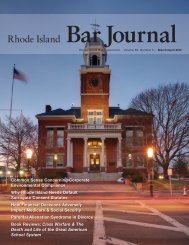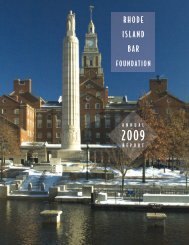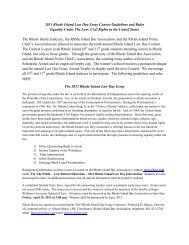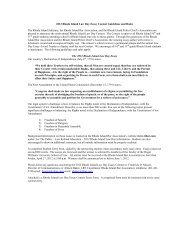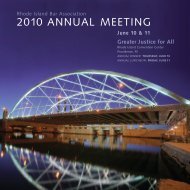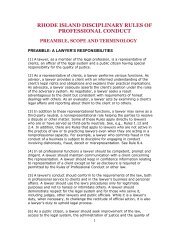Are We Taking The Sex Offender Label Too Far? - Rhode Island Bar ...
Are We Taking The Sex Offender Label Too Far? - Rhode Island Bar ...
Are We Taking The Sex Offender Label Too Far? - Rhode Island Bar ...
You also want an ePaper? Increase the reach of your titles
YUMPU automatically turns print PDFs into web optimized ePapers that Google loves.
BOOK REVIEW<br />
Constitution Day:<br />
Reflections by Respected Scholars<br />
edited by Patrick T. Conley, Esq.<br />
Jay S. Goodman, Esq.<br />
Professor of Political<br />
Science, Wheaton College<br />
For those who like<br />
a good evening’s<br />
reading on historical<br />
constitutional<br />
issues, serious, but<br />
not law review<br />
heavy, this book<br />
satisfies.<br />
Between 2000 and 2009, Patrick T. Conley<br />
sponsored an annual Constitution Day event,<br />
on or around September 17th, at his Bristol,<br />
<strong>Rhode</strong> <strong>Island</strong> home, Gail Winds. He invited<br />
between 100 and 250 guests and, along with<br />
various rituals including colonial militia reenactors<br />
and patriotic bands, there was a speech<br />
on the Constitution by a prominent, visiting<br />
scholar. Attorney Conley describes these events<br />
as part scholarly exercise and part social spectacle.<br />
This published volume contains twelve<br />
commentaries on the Federal Constitution, each<br />
with an afterword by Conley providing a <strong>Rhode</strong><br />
<strong>Island</strong> focus to the federal issue. <strong>The</strong>re is a lot<br />
here that is self-referential, including his event<br />
sponsorship and gracious hosting with his wife,<br />
as well as photographs with his six former dissertation<br />
students from Providence College and<br />
of his 7,000 volume private library. <strong>The</strong> published<br />
remarks also contain the informal complements<br />
and little jokes of participants who<br />
know each other very well. But, at its core, the<br />
volume is a serious festschrift, with the honoree<br />
being the Constitution of the United States.<br />
Among the chapter authors are: retired<br />
Brown Professor Gordon S. Wood, a Pulitzer<br />
Prize winner; retired John Hopkins British<br />
empire scholar Jack P. Greene; John P. Kaminski,<br />
who has worked on the documentation of the<br />
Constitution project at Madison for forty years;<br />
Brown University Bancroft Prize winner James<br />
T. Patterson; longtime Stanford constitutional<br />
history professor Jack N. Rakove; Hunter<br />
College and CCNY historian of women in the<br />
colonies, Carol Ruth Berkin; MIT Professor<br />
Pauline Maier, a scholar of the politics of the<br />
American Revolution; 18th and 19th constitutional<br />
scholar, William M. Wiecek; retired<br />
<strong>Rhode</strong> <strong>Island</strong> Supreme Court Chief Justice<br />
Joseph R. <strong>We</strong>isberger; retired Connecticut State<br />
Historian Christopher Collier; University of<br />
Kentucky historian of mid-19th century populist<br />
movements Ronald P. Formisano; and<br />
Conley himself.<br />
Most of commentaries are on 18th and 19th<br />
century constitutional cases and issues, but two<br />
cover 20th century constitutional cases or<br />
processes. <strong>The</strong> topics are: an interpretation of<br />
Marbury v. Madison; the 18th century pursuit<br />
of an independent judiciary; the three stages of<br />
the American Revolution; the creation of the<br />
1787 constitution; the drive to change the<br />
Articles of Confederation and the resistance to<br />
the new stronger Constitution; the argument<br />
of the opponents of the Constitution, the antifederalists,<br />
sympathetically revisited; the contributions<br />
of <strong>Rhode</strong> <strong>Island</strong> to national constitutional<br />
issues; the step-by-step incorporation of<br />
the Bill of Rights to the states; the early constitutional<br />
land case of Van Horne’s Lessee v.<br />
Dorrance; the unsuccessful 19th century push<br />
for broadened suffrage in <strong>Rhode</strong> <strong>Island</strong> leading<br />
to the “Dorr War;” and the rejection of suffrage<br />
for unpropertied Irish immigrants in <strong>Rhode</strong><br />
<strong>Island</strong> after the Civil War.<br />
Some of the collected speeches are informal<br />
and undocumented, while others are scholarly,<br />
complete with footnotes and references. As<br />
examples of the contents, I present the following<br />
overviews of two essays concerning, respectively,<br />
valid objections to the United States<br />
Constitution during its creation and the struggle<br />
for individual voting rights in <strong>Rhode</strong> <strong>Island</strong>.<br />
Most of us have never devoted much thought<br />
to the issues surrounding the 1787 ratification<br />
of our Constitution. It’s just there, and, certainly,<br />
if we know anything at all about its original<br />
opponents, the anti-federalists, they are seen<br />
as rural rubes who tried to keep the emerging<br />
government in the former colonies weak and<br />
decentralized. Simple passage of time, plus our<br />
continued veneration of the founding fathers,<br />
blurs what were legitimate controversies at the<br />
time. Pauline Maier’s contribution, Take This<br />
or Nothing: Did the Anti-Federalists Have a<br />
Case?, calls our easy assumptions into question.<br />
She points out that our understanding of the<br />
period is pro-federalist. <strong>We</strong> see the story as the<br />
Federalists themselves saw it. And, there is justification<br />
for the Federalists’ contemporary view<br />
of their sophistication and their success, including<br />
that their version of the document is still<br />
in place.<br />
Maier revisits original documents and press<br />
commentaries. She finds that many good ideas<br />
were rejected at the Convention. Anti-Federalist<br />
<strong>Rhode</strong> <strong>Island</strong> <strong>Bar</strong> Journal November/December 2011 27





